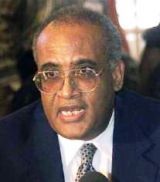AU mediators fight to get Darfur peace talks off the ground
ABUJA, June 11 (AFP) — African Union mediators were fighting Saturday to get talks aimed at resolving the civil war in Sudan’s Darfur region off the ground, amid arguments over the participation of other countries.
 The talks, originally scheduled to resume at 10:00 am (0900 GMT) in a conference centre in the Nigerian capital under the aegis of the African Union (AU), were finally set to begin at 4:00 pm.
The talks, originally scheduled to resume at 10:00 am (0900 GMT) in a conference centre in the Nigerian capital under the aegis of the African Union (AU), were finally set to begin at 4:00 pm.
But a member of the AU mediation team said they would be restricted to the protagonists in the conflict, the Khartoum government and the two rebel groups, the Justice and Equality Movement (JEM) and the the Sudan Liberation Movement (SLM), with chief mediator Salim Ahmed Salim in the chair.
Another AU source said the blockage centred on the participation of Sudan’s neighbours Chad, strongly resisted by the JEM, and Eritrea, opposed by Khartoum.
The AU earlier said the talks had been delayed while Salim, a former Tanzanian foreign minister and secretary general of the Organisation of African Unity, the AU’s predecessor, had consultations with the various parties.
The consultations covered “several issues, relating to the agenda and programme of work as well as the format of the talks,” a statement said, adding, “The mediation team has also held meetings with Nigerian and Libyan facilitators as well as with international partners.”
The fifth round of talks, and the first for six months, to end the war that has claimed between 180,000 and 300,000 lives, displaced 2.4 million people and sent another 200,000 fleeing to Chad, formally opened here Friday.
The leaders of the SLM and JEM, Mohammed Al-Nour and Ibrahim Khalil respectively, are attending for the first time, while Agriculture Minister Majzoub al-Khalifa continues to head the government side.
Khalil spoke out swiftly against the presence of a Chadian delegation, accusing Ndjamena of siding with the Khartoum government in the conflict and detaining several of his men.
Suan’s ambassador to Nigeria, Abdeul Rahim Khali, for his part said Khartoum saw no reason for Asmara to join the talks for the first time.
A Western diplomat agreed, saying, “the negotiations are primarily between the Sudanese, the rebels and the government. They must continue talking without the dialogue being blurred by other considerations.”
As the talks opened Friday, Sudanese forces attacked a garrison of AU peace monitors at El Fasher in Darfur and seized JEM members who were in the camp.
Nigerian General Festus Okonkwo, commander of the peacekeeping and observer mission of 2,700-member Nigerian and Rwandan troops said the JEM should have moved its men out earlier.
An expanded mission force of 6,171 men is set to be in place by September, including military observers and peacekeepers and a civilian police contingent of 1,560.
The Abuja talks will take place behind closed doors in the presence of international observers. AU officials have said they expect them to wrap up within three weeks with a solution.
The talks which began in August 2004 were suspended in December to allow for more consultations among the warring parties, who were accusing each other of violating ceasefire agreements.
Violence broke out in Darfur in February 2003 when a rebel uprising against the government led Khartoum to unleash Arab militias known as Janjaweed on a scorched-earth campaign.
The Janjaweed in particular are accused of “ethnic cleansing”, torture, rape and intimidation.
Humanitarian officials have warned the situation in Darfur is growing more desperate, with not enough funding to meet the crisis caused by drought, famine and the long-term effects of conflict.
According to the AU mission in Darfur, violent clashes between the SLM and JEM last week claimed 11 lives while 17 others were injured.
